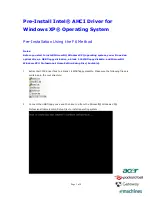
Threshold Configuration
EPICenter Reference Guide
129
The Configurations tree shows the existing RMON rule definitions as nodes in the tree, with the devices
to which they are applied shown as subnodes. The main panel shows the definition for the selected rule
on each target device.
CPU Utilization is a predefined node in the Configurations tree. Devices on which a CPU utilization
rule is configured are shown as subnodes of the CPU Utilization node. There can be only one CPU
utilization rule per device.
Click the small plus next to a rule node to display in the tree the devices associated with that rule.
To display the definition of a rule, click the rule node.
RMON Rule Display
For RMON rules, the display shows the following for each device targeted by that rule:
For a detailed definition of these parameters, see
“Configuring an RMON Rule” on page 133
.
CPU Utilization Rule Display
To display the CPU Utilization rules, click the CPU Utilization node in the Configurations tree.
Figure 57
shows the Alarm System Configuration page as it appears when displaying CPU
Configuration rules for a selected device.
Device
The name of the device
Port
The port to which the rule applies
Variable
The MIB variable being monitored
Sample Type
Absolute or Delta
Sample Interval
The time between samples, in seconds.
Rising Threshold
A threshold value that triggers an event when the value of the variable increments past this
value.
Falling Threshold
A threshold value that triggers an event when the value of the variable decreases past this
value.
Startup
The condition that causes the initial event (Rising, Falling, or RisingOrFalling).
Index
The rule’s row index in the SNMP tables as obtained from the device’s SNMP agent.
Summary of Contents for EPICenter 6.0
Page 14: ...EPICenter Reference Guide 14 ...
Page 18: ...Preface EPICenter Reference Guide 18 ...
Page 19: ...1 EPICenter Basic Features ...
Page 20: ......
Page 24: ...EPICenter Overview EPICenter Reference Guide 24 ...
Page 44: ...Getting Started with EPICenter EPICenter Reference Guide 44 ...
Page 100: ...The Inventory Manager EPICenter Reference Guide 100 ...
Page 140: ...The EPICenter Alarm System EPICenter Reference Guide 140 ...
Page 172: ...Configuration Manager EPICenter Reference Guide 172 ...
Page 196: ...The Firmware Manager EPICenter Reference Guide 196 ...
Page 220: ...The Interactive Telnet Feature EPICenter Reference Guide 220 ...
Page 250: ...The Grouping Manager EPICenter Reference Guide 250 ...
Page 276: ...Real Time Statistics EPICenter Reference Guide 276 ...
Page 342: ...Using the VLAN Manager EPICenter Reference Guide 342 ...
Page 348: ...The ESRP Monitor EPICenter Reference Guide 348 ...
Page 446: ...EPICenter Reports EPICenter Reference Guide 446 ...
Page 447: ...2 Advanced Upgrade Features ...
Page 448: ......
Page 480: ...EAPS Protocol Monitoring and Verification EPICenter Reference Guide 480 ...
Page 508: ...Using the Policy Manager EPICenter Reference Guide 508 ...
Page 525: ...3 Appendices ...
Page 526: ......
Page 542: ...EPICenter Backup EPICenter Reference Guide 542 ...
Page 564: ...Voice over IP Manager EPICenter Reference Guide 564 ...
Page 580: ...EPICenter Reference Guide 580 ...
















































